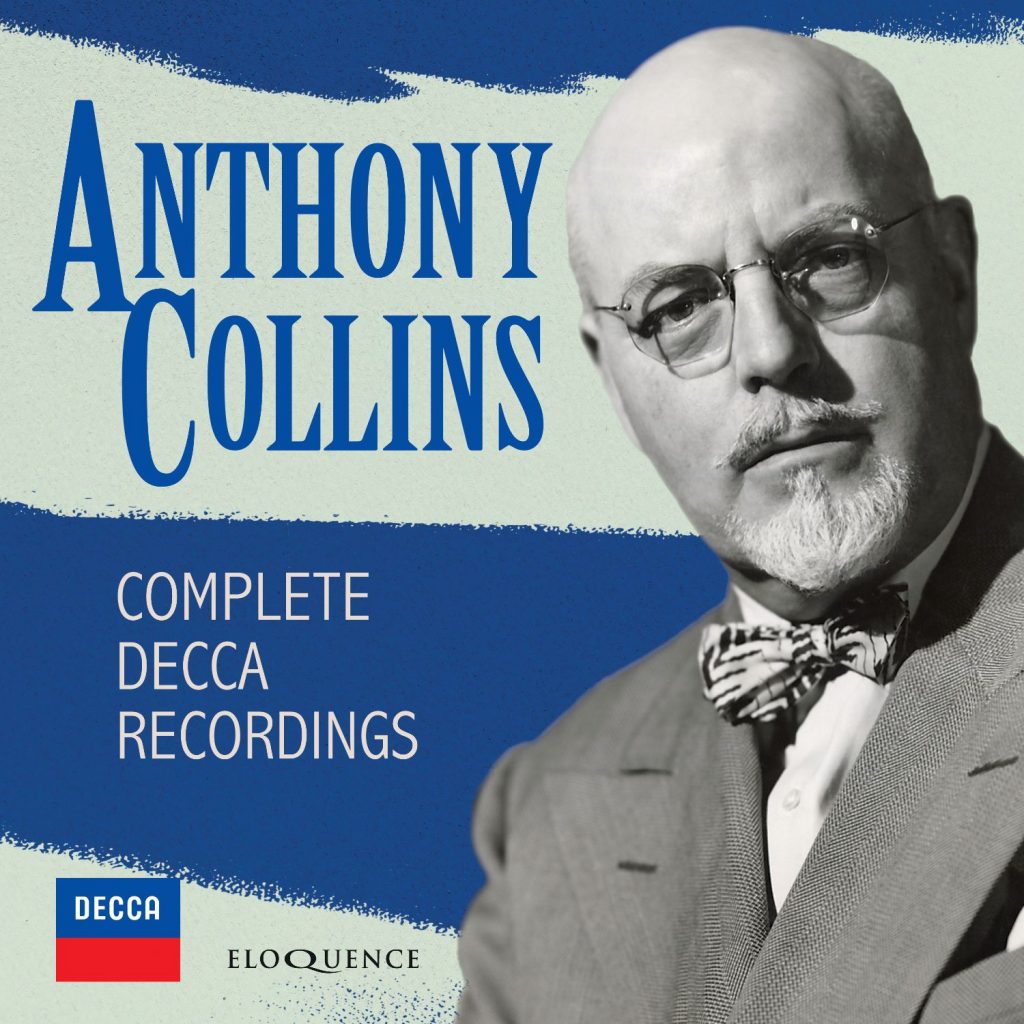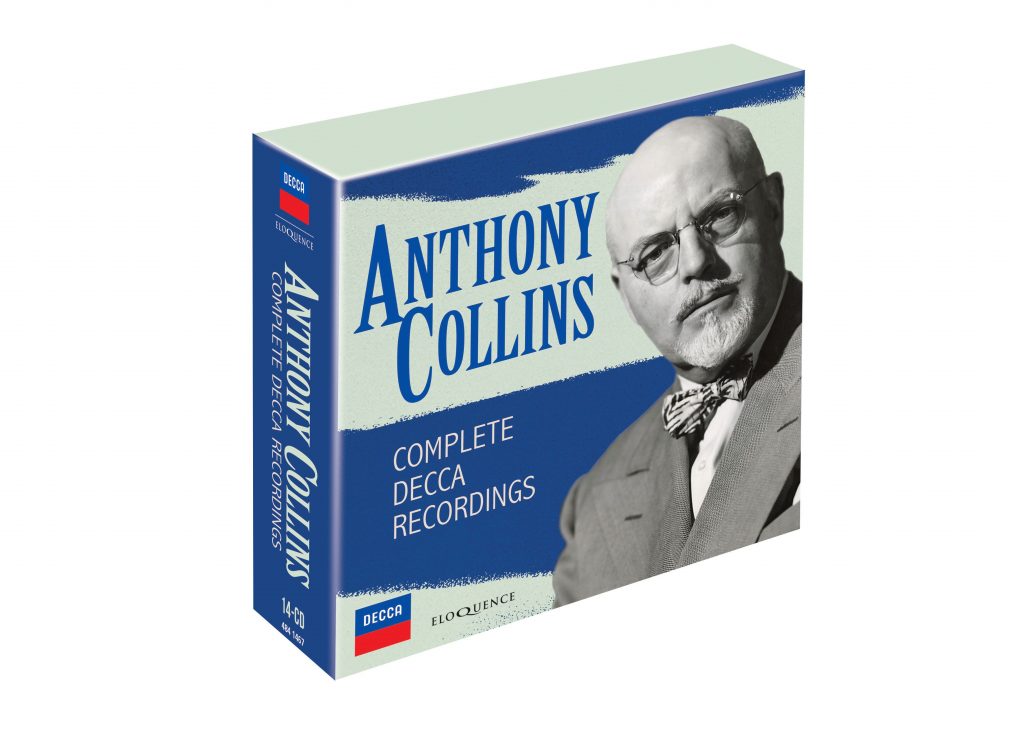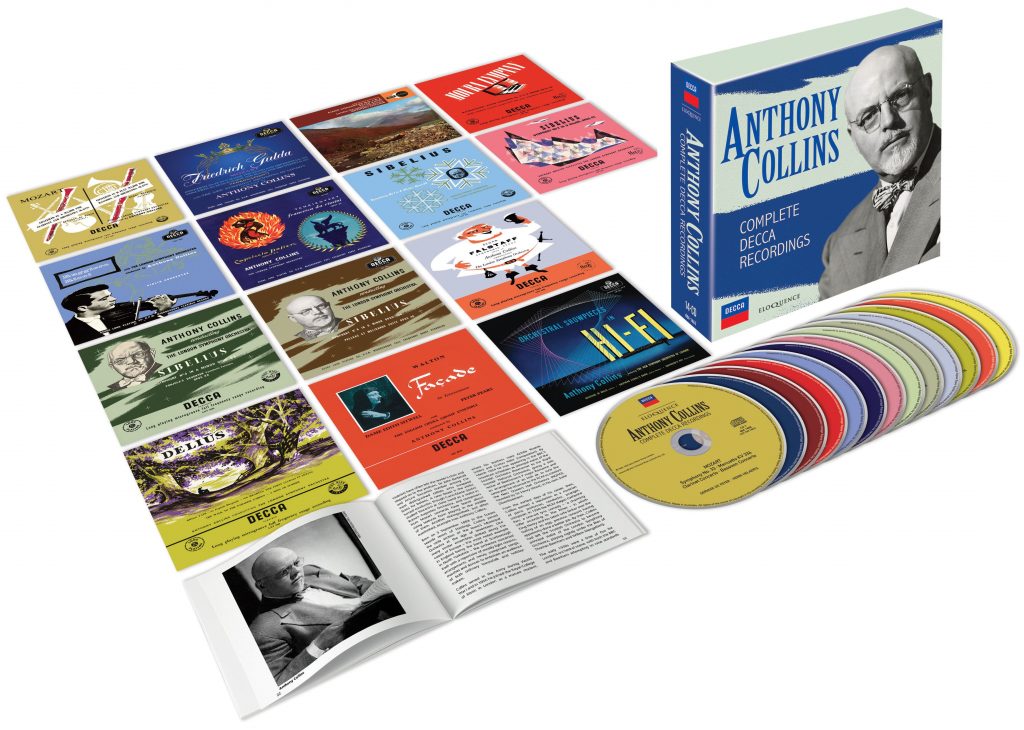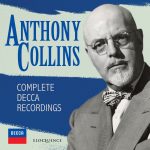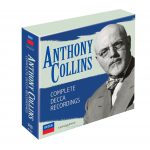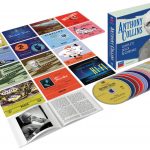From the earliest days of his career, Anthony Collins (1893–1963) earned a reputation as a musician of parts: violist, conductor, arranger and composer. He had led the viola section of the London Symphony Orchestra under Beecham and Mengelberg before swapping bow for baton in the 1930s, and by then had already begun to promote the music of Sibelius. Then Hollywood came calling, and he spent the War in the US as an Oscar-nominated film composer writing for RKO Studios.
He began to record for Decca directly after the War, first of all with the London Mozart Orchestra which he had founded shortly before leaving for the US. Renowned by then as a Mozartian of natural gifts, securing shapely and stylish performances independently of either the grand Viennese tradition or the period-instrument movement in its infancy, he accompanied the pianist Friedrich Gulda – a kindred spirit of similarly mercurial imagination – in concertos and concertante works by Mozart and Strauss, and then Peter Katin in Mendelssohn, and Moura Lympany in Rachmaninov. He re-established a close rapport with the LSO, conducting them in several albums of Elgar, Vaughan Williams and Delius that have rarely been equalled for their directness of expression and intensity.
These virtues still distinguish the cycle of Sibelius symphonies and tone-poems, made in the mid-50s with the LSO, from later interpretations. A generation of English and American listeners learnt their Sibelius from these recordings, and Collins’s deep fellow-feeling for his music stands the test of time. The Decca recordings included a Tchaikovsky album of Capriccio Italien and Francesca da Rimini as well as a pair of his own compositions, and other masterpieces of English light music by Walton – a complete Façade – Sullivan and Grainger. Items never previously issued on CD include dance suites from Hänsel und Gretel and Der Rosenkavalier, as well as the Mozart Symphony No.33 which began his relationship with the label. The booklet offers full discographical details as well as an essay on Collins’s life and career by Peter Quantrill.
CD 1
WOLFGANG AMADEUS MOZART (1756–1791)
Symphony No. 33 in B flat major, KV 319*
Menuetto (from Divertimento in D major, KV 334)*
London Mozart Orchestra
ANTHONY COLLINS
Clarinet Concerto in A major, KV 622
Bassoon Concerto in B flat major, KV 191
Gervase de Peyer, clarinet
Henri Helaerts, bassoon
London Symphony Orchestra
ANTHONY COLLINS
*FIRST CD RELEASE ON DECCA
CD 2
WOLFGANG AMADEUS MOZART (1756–1791)
Piano Concerto No. 14 in E flat major, KV 449
Piano Concerto No. 25 in C major, KV 503
Piano Concerto No. 26 in D major, KV 537 ‘Coronation’
Friedrich Gulda, piano
London Symphony Orchestra (No. 14)
New Symphony Orchestra (Nos. 25 and 26)
ANTHONY COLLINS
CD 3
FELIX MENDELSSOHN (1809–1847)
Piano Concerto No. 1 in G minor, Op. 25
Piano Concerto No. 2 in D minor, Op. 40
Peter Katin, piano
London Symphony Orchestra
ANTHONY COLLINS
CD 4
SERGEI RACHMANINOV (1873–1943)
Piano Concerto No. 3 in D minor, Op. 30
Moura Lympany, piano
New Symphony Orchestra
ANTHONY COLLINS
RICHARD STRAUSS (1864–1949)
Burleske in D minor for Piano and Orchestra
Friedrich Gulda, piano
London Symphony Orchestra
ANTHONY COLLINS
CD 5
NICCOLÒ PAGANINI (1782–1840)
Violin Concerto No. 1 in D major, Op. 6
Violin Concerto No. 2 in B minor, Op. 7
Ruggiero Ricci, violin
London Symphony Orchestra
ANTHONY COLLINS
CD 6
GEORGES BIZET (1838–1875)
Carmen Suite No. 1 (excerpts)*
MANUEL DE FALLA (1876–1946)
El amor brujo – Suite*
PYOTR ILYICH TCHAIKOVSKY (1840–1893)
Capriccio Italien, Op. 45
Francesca da Rimini, Op. 32
London Philharmonic Orchestra (Bizet, Falla)
London Symphony Orchestra (Tchaikovsky)
ANTHONY COLLINS
*FIRST CD RELEASE ON DECCA
CD 7
JEAN SIBELIUS (1865–1957)
Karelia Overture, Op. 10
Symphony No. 1 in E minor, Op. 39
Symphony No. 7 in C major, Op. 105
London Symphony Orchestra
ANTHONY COLLINS
CD 8
JEAN SIBELIUS (1865–1957)
Symphony No. 2 in D major, Op. 43
Symphony No. 3 in C major, Op. 52
London Symphony Orchestra
ANTHONY COLLINS
CD 9
JEAN SIBELIUS (1865–1957)
Symphony No. 4 in A minor, Op. 63
Symphony No. 5 in E flat major, Op. 82
London Symphony Orchestra
ANTHONY COLLINS
CD 10
JEAN SIBELIUS (1865–1957)
Symphony No. 6 in D minor, Op. 104
Pohjola’s Daughter, Op. 49
Pelléas et Mélisande, Op. 46 – Suite (excerpts)
Nightride and Sunrise, Op. 55
London Symphony Orchestra
ANTHONY COLLINS
CD 11
SIR EDWARD ELGAR (1857–1934)
Falstaff – Symphonic Study, Op. 68
Introduction and Allegro for Strings, Op. 47
Serenade for String Orchestra in E minor, Op. 20
RALPH VAUGHAN WILLIAMS (1872–1958)
Fantasia on a theme by Thomas Tallis
Fantasia on Greensleeves
London Symphony Orchestra (Elgar: Falstaff)
Members of the New Symphony Orchestra of London
ANTHONY COLLINS
CD 12
FREDERICK DELIUS (1862–1934)
The Walk to the Paradise Garden (Intermezzo, from A Village Romeo and Juliet)
A Song of Summer
Brigg Fair – An English Rhapsody
On Hearing the First Cuckoo in Spring
Paris (The Song of a Great City)
London Symphony Orchestra
ANTHONY COLLINS
CD 13
FREDERICK DELIUS (1862–1934)
In a Summer Garden
Summer Night on the River
London Symphony Orchestra
ANTHONY COLLINS
SIR WILLIAM WALTON (1902–1983)
Façade – An Entertainment
Sir Peter Pears and Dame Edith Sitwell, reciters
English Opera Group Ensemble
ANTHONY COLLINS
CD 14*
RICHARD STRAUSS (1864–1949)
Der Rosenkavalier – First Suite of Waltzes
ENGELBERT HUMPERDINCK (1854–1921)
Dream Pantomime (from Hänsel und Gretel)
London Philharmonic Orchestra
ANTHONY COLLINS
SIR ARTHUR SULLIVAN (1842–1900)
Overture di Ballo
HENRY BALFOUR GARDINER (1877–1950)
Shepherd Fennel’s Dance
PERCY GRAINGER (1882–1961)
Shepherd’s Hey
New Symphony Orchestra of London
ANTHONY COLLINS
ANTHONY COLLINS (1893–1963)
Vanity Fair
With Emma to Town
London Promenade Orchestra
ANTHONY COLLINS
*FIRST CD RELEASE ON DECCA
CD 1
Recording Producers: Peter Andry (Clarinet Concerto); Victor Olof (Bassoon Concerto); unknown (Symphony No. 33, Divertimento)
Balance Engineers: Kenneth Wilkinson (Symphony No. 33, Divertimento); Arthur Lilley (Bassoon Concerto); unknown (Clarinet Concerto)
Recording Location: Decca Studios, West Hampstead, London, UK, 28–29 May 1945 (Symphony No. 33, Divertimento), 13–14 July 1954 (Clarinet Concerto), 9–10 August 1954 (Bassoon Concerto)
Original Decca Releases: AK1249-51 (Symphony No. 33, Divertimento; Matrices: AR9447/52): July 1949; LXT 2990 (Clarinet Concerto, Bassoon Concerto): November 1954
Transfers and Audio Restoration (Symphony No. 33, Divertimento): Mark Obert-Thorn. With thanks to Nathan Brown, Michael Gartz and Charles Niss for providing source material
CD 2
Recording Producers: Victor Olof (Piano Concerto No. 14); John Culshaw (Piano Concertos Nos. 25 and 26)
Balance Engineers: unknown
Recording Locations: Kingsway Hall, London, UK, 15–16 September 1954 (Piano Concerto No. 14); Carlton Rooms, Maida Vale, London, UK, 19–21 September 1955 (Piano Concertos Nos. 25 and 26)
Original Decca Releases: LXT 5013 (Piano Concerto No. 14): February 1955; LXT 5138 (Piano Concertos Nos. 25 and 26): April 1956
CD 3
Recording Producer: James Walker
Balance Engineers: Kenneth Wilkinson; James Brown
Recording Location: Kingsway Hall, London, UK, 9–10 February 1956
Original Decca Release: LXT 5201: June 1956
CD 4
Recording Producers: John Culshaw (Rachmaninov); Victor Olof (Strauss)
Balance Engineers: Kenneth Wilkinson (Rachmaninov); unknown (Strauss)
Recording Location: Kingsway Hall, London, UK, 27, 29 May 1952 (Rachmaninov), 15–16 September 1954 (Strauss)
Original Decca Releases: LXT 2701 (Rachmaninov): August 1952; LXT 5013 (Strauss): February 1955
CD 5
Recording Producer: Victor Olof
Balance Engineers: unknown
Recording Location: Kingsway Hall, London, UK, 14 February 1955 (Violin Concerto No. 1), 18 February 1955 (Violin Concerto No. 2)
Original Decca Release: LXT 5075: September 1955
CD 6
Recording Producers: Victor Olof (Bizet, Falla); James Walker (Tchaikovsky)
Balance Engineers: unknown (Bizet, Falla); Kenneth Wilkinson, James Brown (Tchaikovsky)
Recording Location: Kingsway Hall, London, UK, 3 February 1950 (Bizet), 4 February 1950 (Falla), 17–18 January 1956 (Tchaikovsky)
Original Decca Releases: AK2352-54, LXT 2510 (Bizet): June 1950; LXT 2518 (Falla): October 1950; LXT 5186 (Tchaikovsky): April 1956
CD 7
Recording Producers: Victor Olof (Symphonies Nos. 1, 7); James Walker (Karelia Overture)
Balance Engineer: Kenneth Wilkinson
Recording Location: Kingsway Hall, London, UK, 21–22 February 1952 (Symphony No. 1), 22–25 February 1954 (Symphony No. 7), 2–3 June 1955 (Karelia)
Original Decca Releases: LW 5209 (Karelia): December 1955; LXT 2694 (Symphony No. 1): August 1952; LXT 2960 (Symphony No. 7): September 1954
CD 8
Recording Producers: Victor Olof (Symphony No. 2); Peter Andry (Symphony No. 3)
Balance Engineer: Kenneth Wilkinson
Recording Location: Kingsway Hall, London, UK, 11–12 May 1953 (Symphony No. 2), 5–6 May 1954 (Symphony No. 3)
Original Decca Releases: LXT 2815 (Symphony No. 2): September 1953; LXT 2960 (Symphony No. 3): September 1954
CD 9
Recording Producer: Victor Olof
Balance Engineer: Kenneth Wilkinson
Recording Location: Kingsway Hall, London, UK, 22–25 February 1954 (Symphony No. 4), 25–27 January 1955 (Symphony No. 5)
Original Decca Releases: LXT 2962 (Symphony No. 4): September 1954; LXT 5083 (Symphony No. 5): September 1955
CD 10
Recording Producers: Victor Olof (Symphony No. 6); Peter Andry (Pohjola’s Daughter); James Walker (Pelléas et Mélisande, Nightride and Sunrise)
Balance Engineer: Kenneth Wilkinson
Recording Location: Kingsway Hall, London, UK, 25–27 January 1955 (Symphony No. 6), 5–6 May 1954 (Pohjola’s Daughter), 2–3 June 1955 (Pelléas et Mélisande, Nightride and Sunrise)
Original Decca Releases: LXT 5084 (Symphony No. 6; Pelléas et Mélisande: Nos. 2, 7, 8, 9): September 1955; LXT 2962 (Pohjola’s Daughter): September 1954; LW 5209 (Pelléas et Mélisande: No. 6): December 1955; LXT 5083 (Nightride and Sunrise): September 1955
CD 11
Recording Producers: James Walker (Elgar: Falstaff); Victor Olof (Elgar: Introduction and Allegro for strings, Serenade for String Orchestra; Vaughan Williams)
Balance Engineers: Kenneth Wilkinson (Elgar: Falstaff); unknown (Elgar: Introduction and Allegro for strings, Serenade for String Orchestra; Vaughan Williams)
Recording Locations: Kingsway Hall, London, UK, 22–25 February 1954 (Elgar: Falstaff); West Hampstead Studios, London, UK, 31 March–1 April 1952 (Elgar: Introduction and Allegro for strings, Serenade for String Orchestra; Vaughan Williams)
Original Decca Releases: LXT 2940 (Elgar: Falstaff): June 1954; LXT 2699 (Elgar: Introduction and Allegro for strings, Serenade for String Orchestra; Vaughan Williams): September 1952
CD 12
Recording Producers: Victor Olof (The Walk to the Paradise Garden, A Song of Summer, Brigg Fair, On Hearing the First Cuckoo in Spring); John Culshaw (Paris)
Balance Engineer: Kenneth Wilkinson
Recording Location: Kingsway Hall, London, UK, 23–25 February 1953 (The Walk to the Paradise Garden, A Song of Summer, Brigg Fair, On Hearing the First Cuckoo in Spring), 20–21 October 1953 (Paris)
Original Decca Releases: LXT 2788 (The Walk to the Paradise Garden, A Song of Summer, Brigg Fair, On Hearing the First Cuckoo in Spring): May 1953; LXT 2899 (Paris): March 1954
CD 13
Recording Producers: John Culshaw (Delius); Peter Andry (Walton)
Balance Engineers: Kenneth Wilkinson (Delius); unknown (Walton)
Recording Locations: Kingsway Hall, London, UK, 20–21 October 1953 (Delius); West Hampstead Studios, London, UK, 7–8 July, 10–11 August 1954 (Walton)
Original Decca Releases: LXT 2899 (Delius): March 1954; LXT 2977 (Walton): October 1954
CD 14
Recording Producers: James Walker (Sullivan, Gardiner, Grainger); unknown (Strauss, Humperdinck, Collins)
Balance Engineers: Kenneth Wilkinson (Sullivan, Gardiner, Grainger); Gordon Parry (Sullivan); unknown (Strauss, Humperdinck, Collins)
Recording Locations: Kingsway Hall, London, UK, 14 April 1950 (Strauss, Humperdinck), 5–6 December 1956 (Sullivan, Gardiner, Grainger); Decca Studios, West Hampstead, London, UK, 21 June 1954 (Collins)
Original Decca Releases: LK 4017 (Strauss, Humperdinck): May 1951; LW 5297 (Sullivan, Gardiner, Grainger): June 1957; F10337 (Collins): September 1954
Remastering Engineer: Chris Bernauer
“Collins secures really authoritative performances.” Musical Times, February 1955 (Sibelius: Symphonies Nos. 3 & 7)
“A fine recording … a lively performance, and the excerpt from Humperdinck’s Hansel and Gretel, on the reverse is equally good.” Tempo, Autumn 1953
“A faultless recording was required here and the artists have been rewarded with one.” Tempo, Winter 1954 (Walton)
“Carefully played and extremely well recorded … The disc is bound to give considerable pleasure.’ The Record Guide, 1955 (Delius: Brigg Fair, etc.)
“This is a most beautiful record … Paris is a flawless achievement. The conductor has shown great cleverness in combining the Toulouse-Lautrec side of this luxurious music with the tender passages which offset it … The recording is so good that one forgets the presence of the gramophone.” The Record Guide, 1955 (Delius: Paris, etc.)
“The performances are in the best sense traditional, and in the Introduction and Allegro Anthony Collins has been at pains to make the quartet of soloists clearly distinguishable from the main body of players” The Record Guide, 1955 (Elgar)
“His reading of the Sixth Symphony is a model of clarity. proportion, and Nordic spirit; and, like most of his other discs in this series, it has been admirably recorded.” High Fidelity, February 1956 (Sibelius: Symphony No. 6)
“The Burleske, thoroughgoing Brahms, is vivid, uninhibited, and unserious in a becomingly brilliant performance and recording that complete a disk of first order.” High Fidelity, May 1955 (Mozart: Piano Concerto KV 449; Strauss)
“A very pleasant record … [Collins’s] customary verve is obviously infectious.” High Fidelity, December 1956 (Mendelssohn)
“The recording is a superb example of London’s sound at its best. Under the direction of Collins, a very knowledgeable musician in media like these, there emerge performances that glow with an inner light. There is faultless balance, fine pace, a high finish.” High Fidelity, January 1953 (Elgar, Vaughan Williams)
“There are those who (justly) count Anthony Collins’s magnificent account of the First Symphony as the finest ever put on disc, for the tension throughout the performance is held at the highest level … The closely integrated Seventh is also well understood by Collins.’ Penguin Guide, 1996 (Sibelius: Symphonies)
“The performance is superb, held together with a tension that carries the listener through from the first bar to the last.” Penguin Guide, 1996 (Sibelius: Symphony No.2)
“[Sibelius’s Fourth Symphony] as a whole has extraordinary underlying intensity. With Collins, every phrase breathes naturally … The performance of No. 5 carries all before it.” Penguin Guide, 1996
“This is ideal Mozart: no tampering with dynamics or tempos, great clarity, and winning distinctiveness.” Fanfare, March 2012 (Mozart: Piano Concertos)
“Capriccio Italien is brisk, taut, and vividly colorful, with a light touch betraying Collins’s wartime experience in Hollywood’s film studios. Francesca da Rimini is hard-driven, with astute rhythmic pointing, stinging accents, and an exciting sense of all-out involvement from the LSO.” Fanfare, March 2012
“These interpretations imply a Sibelius you won’t hear again, and that’s the reason I think you should own them.” Fanfare, July 2008 (Sibelius)




